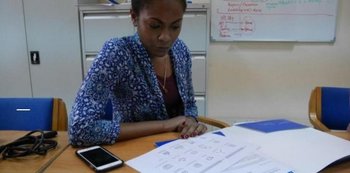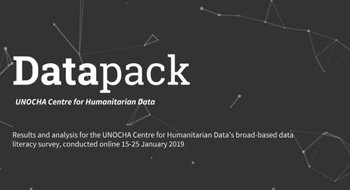OCHA’s Centre for Humanitarian Data (‘the Centre’) has a data literacy workstream focused on increasing the capacity of humanitarians to access and use data. We aim to create easy entry points for people from different roles and backgrounds to build their data skills. Below, we explain why all humanitarians need data skills and how they can build them.

User research with OCHA staff in New York in February 2019. Photo credit: The Centre’s Data Literacy Team
Irrespective of job title, all humanitarians need to understand how the data we have is shaped by the questions we ask. We need to deepen our understanding of the real challenges of gathering, cleaning and analysing the right data in different humanitarian contexts. And we must be able to read, interpret and interrogate analysis for insights to answer those guiding questions.
For example, humanitarian advisors need to be able to contextualise and synthesise analysis for decision makers. They often need to do simple data analysis or to present data to different stakeholders. Key to performing these tasks is a comfort level in working with spreadsheets.
Learning data skills
Data literacy includes the ability to read, work with, analyse and converse with data. Building data skills has the following benefits:
- Empowering non-technical humanitarians to use data more effectively
- Bridging the gap between technical staff and decision makers on data needs
- Increasing demand for better data and more targeted data collection
- Improving conversations around data so that no one gets lost in technical language
Data skill building takes time and humanitarians are busy people. Based on our research and good practice in learning uptake, we think there are three ways to best support humanitarians to become more data savvy:
1. Micro-learning for specific tasks
Often people need to learn how to perform a single task. This can range from trying to create a dropdown list in Excel, choosing the right chart for a presentation or adding HXL hashtags to a spreadsheet. Often, you might get blocked in the middle of a task, such as cleaning or processing. This is not the time to stop what you are doing and sign up for an online Excel course. For this audience, how to’s, quick videos and cheat sheets can be used to quickly support task completion.
2. Include on-the-job support in intensive learning programme
It is critical to create the space for humanitarians to step away from their day-to-day work to acquire new skills. However, these trainings have to be followed with rapid on-the-job application or the new skills will be forgotten. This is especially true when you are new to working with data. After you’ve made 1,000 pivot tables, it becomes second nature but with your first few, you are going to have challenges. Having trainers available after training programmes to answer questions and troubleshoot as learners develop their confidence can make all the difference.
3. Provide exposure to experts in the field
Issues around data and new technologies are in the news every day, and it is easy to get overwhelmed. Humanitarians are often left wondering how blockchain, predictive analytics, big data and drones may impact their work. One way to gain knowledge is by listening to experts who are focused on data and technology in their daily work. Experts can also help humanitarians cut through the hype and jargon to understand the practical application of new and better ways of working with data.
In addition to training working-level humanitarians, developing knowledge within the senior leadership of an organisation is essential. Not only are they crucial to the data management process, they can drive an organisation’s data culture and can use their influence to ensure smart investments in data.
Data Skills Survey: What we found
In January 2019, the Centre conducted an online survey to better understand how humanitarians are using data, what their core data skills are and what kind of support they require to improve their capacity to use data effectively. Over 1,200 people completed the survey from 111 countries with the greatest response rate from people working outside of headquarters, i.e. those working in regional or country office locations. Data-oriented staff represented a significant share of respondents, however there was strong representation across programme management staff and even senior leadership. A detailed analysis of the survey findings can be found in the survey summary report.
In the survey, over 98% of respondents reported using data all or some of the time. However, in conversations with humanitarians about data, we continue to hear the refrain, ‘I am not a data person’.
Drawing from the survey results and follow up interviews, the Centre found that there is a baseline level of technical proficiency that all

humanitarians require to succeed in an environment where data is becoming an ever more critical part of our work. According to the survey results, analysing data was the most commonly reported task, while collecting primary data, and assessing and improving the quality of data were the most commonly reported challenges.
The Centre’s data literacy programme is just getting started. It will include intensive training courses, microlearning on specific data tasks, curated online resources and a speaker series on data and technology.
- Let us know if we are on the right track by emailing centrehumdata@un.org.
- Read more about elements of the programme in this factsheet and sign up to the Centre’s mailing list to get updates on the latest offerings.